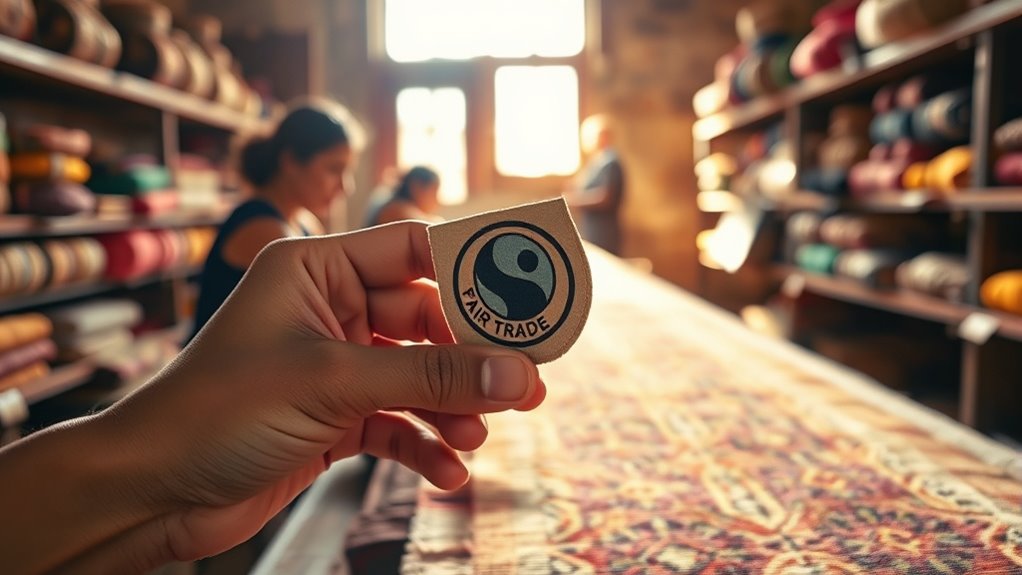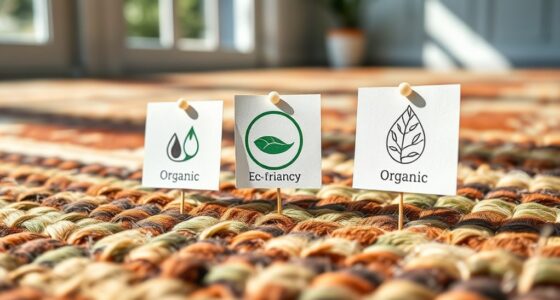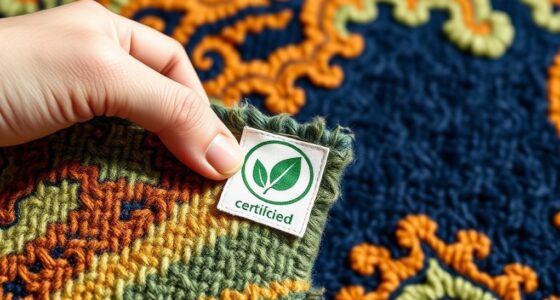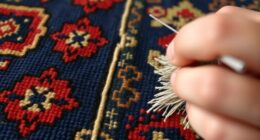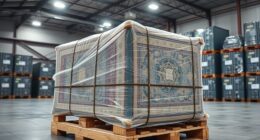To verify fair-trade certifications in ethical weaving, look for trusted labels like Fairtrade, Rainforest Alliance, or Organic that are backed by reputable certification bodies. Check for official logos, confirm accreditation online, and guarantee strict standards are met for fair wages, environmental sustainability, and safe working conditions. Be cautious of fake labels that imitate authentic ones. By understanding the certification process, you’ll be better equipped to support genuine artisans and ensure your purchase aligns with ethical values.
Key Takeaways
- Check for recognized fair-trade labels like Fairtrade, Rainforest Alliance, or Organic, verified through official certification databases.
- Confirm certification validity by verifying third-party audits and looking for official documentation from reputable certifiers.
- Examine the supply chain transparency to ensure artisans are paid fair wages and work in safe, ethical conditions.
- Be cautious of counterfeit logos or unverifiable labels; cross-check certification details on official organization websites.
- Support brands committed to ethical sourcing and sustainable practices by reviewing their transparency and certification credentials.
Understanding the Importance of Fair-Trade Certifications in Ethical Weaving
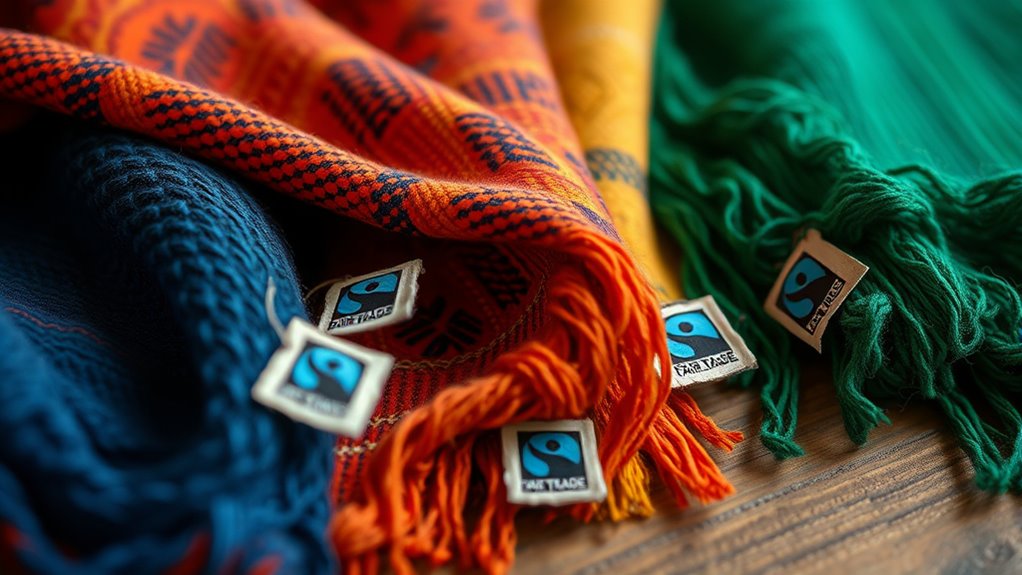
Fair-trade certifications play a crucial role in ensuring that weaving practices are ethical and sustainable. They guarantee that materials are sourced responsibly, promoting sustainable sourcing that minimizes environmental impact. By adhering to fair trade standards, you support artisans who receive fair wages and work in safe conditions, fostering artisan empowerment. These certifications verify that the entire supply chain upholds social and environmental integrity, giving you confidence in the products you choose. When you opt for fair-trade woven items, you’re helping to create a more equitable industry where artisans can thrive. This commitment not only preserves traditional craftsmanship but also encourages sustainable development in weaving communities worldwide. Additionally, color accuracy in the production process ensures that the final products meet high-quality standards that reflect the artisans’ skills. Furthermore, understanding ethical sourcing practices enhances consumer awareness and promotes responsible purchasing decisions. Ultimately, fair-trade certifications align your values with your purchasing choices, making a meaningful difference.
Common Types of Fair-Trade Labels and What They Signify
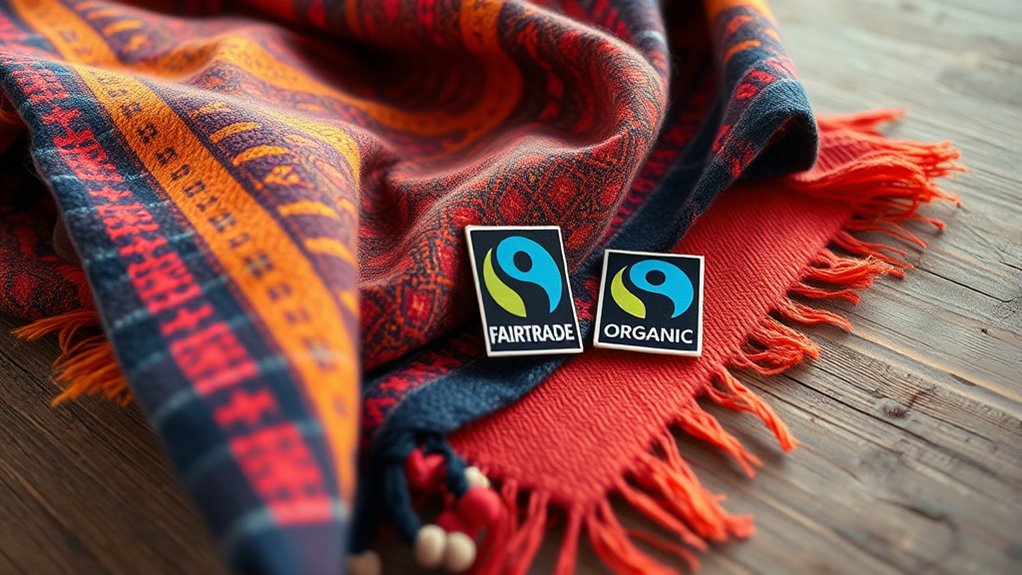
Understanding the different fair-trade labels helps you recognize trusted certification programs and their standards. These labels communicate important information about ethical practices and quality. By knowing the recognized examples, you can make more informed choices when supporting ethical weaving. Familiarity with fair-trade certification processes can also help you identify genuine labels and avoid misleading claims. Developing awareness of creative practice principles can enhance your ability to evaluate the authenticity and impact of various certifications.
Certification Programs Overview
| Certification Program | Key Focus |
|---|---|
| Fairtrade | Fair wages, sustainable sourcing, artisan empowerment |
| Rainforest Alliance | Environmental conservation, social responsibility |
| Organic | Chemical-free farming, eco-friendly practices |
| World Fair Trade Org. | Fair wages, community development, worker rights |
| Ethical Weaving | Ensuring transparency and certification validity, which reflects the commitment to ethical practices and can be verified through recognized labels. Additionally, some certifications incorporate astrological signs in their symbols or branding to symbolize harmony and balance. Recognizing verification processes helps consumers confidently support truly ethical products. Proper verification also involves reviewing auditing procedures to ensure standards are consistently upheld. |
Label Meanings and Standards
Have you ever looked closely at the labels on your eco-friendly products and wondered what they really mean? Fair-trade labels indicate standards related to sustainable sourcing and fair wages for workers. For example, the Fair Trade Certified label guarantees that products come from producers who follow strict guidelines on environmental sustainability and ethical labor practices. Similarly, the Rainforest Alliance seal emphasizes responsible farming that conserves ecosystems. Each label has specific standards that ensure producers receive fair wages and invest in community development. Understanding these labels helps you make informed choices, supporting companies committed to ethical practices. Additionally, the standards set by these labels often incorporate AI data analysis to monitor compliance and verify claims, ensuring transparency and authenticity. This integration of technology enhances certification accuracy and fosters greater consumer trust. Moreover, knowing about zodiac compatibility can provide insights into how personal relationships might be influenced by cultural beliefs, which can be important when considering the ethical and social aspects of products and their origins. Recognizing the independent verification processes behind certification labels further helps distinguish genuine fair-trade products from less credible claims. Keep in mind, though, that not all labels are equally rigorous, so it is vital to learn what each signifies and how they align with genuine fair-trade principles.
Recognized Certification Examples
When you see a fair-trade label on a product, you’re looking at a certification that verifies ethical and sustainable practices. Recognized certifications like Fair Trade Certified, FLO, and Rainforest Alliance ensure that artisans uphold craftsmanship standards and prioritize sustainable sourcing. These labels indicate that the artisans involved are paid fair wages and work in safe conditions, preserving traditional skills. They also confirm that raw materials are sourced responsibly, minimizing environmental impact. For example, Fair Trade Certified often highlights artisan craftsmanship, showcasing handmade goods that support local communities. Rainforest Alliance emphasizes ecological sustainability alongside social fairness. Additionally, these certifications often involve third-party verification, ensuring that standards are independently validated. This verification process helps prevent misuse or false claims, maintaining the integrity of the certification. Moreover, consumers can look for transparent supply chains to confirm ethical practices from source to product. By understanding these labels, you can confidently choose products that promote ethical weaving and support sustainable livelihoods, knowing they meet established standards for fair treatment and environmental care.
Recognizing Authentic Certifications Versus Misinformation
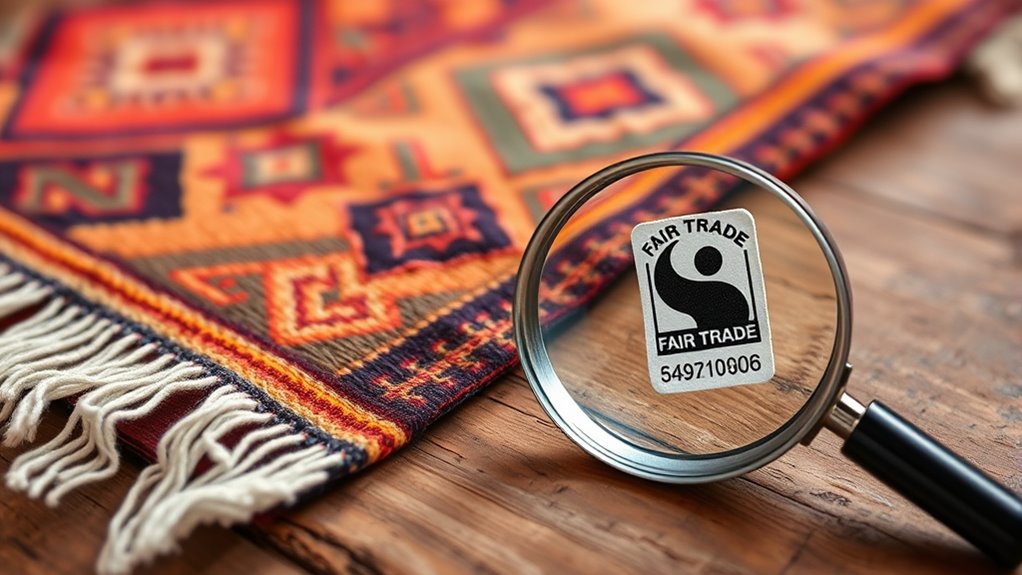
You need to know which certification labels are trustworthy to guarantee ethical sourcing. Fake claims are everywhere, making it easy to be fooled by false certifications. Recognizing legitimate certifications helps you make informed, responsible choices. Understanding Gold IRA Rollovers can also assist in making secure investment decisions aligned with ethical practices. To further verify authenticity, look for specific certification marks that are recognized by reputable organizations. Additionally, being aware of vetted sources ensures that the information you rely on is trustworthy and accurate. Familiarizing yourself with the leasing market can also provide insights into standard practices and genuine endorsements.
Certification Labels to Trust
How can you distinguish genuine certification labels from misleading or false claims? The key is to look for recognized and reputable seals that prioritize transparency and strict standards. Authentic certifications often emphasize sustainable sourcing, ensuring products are responsibly produced without harming the environment. They also promote artisan empowerment, supporting fair wages and community development. Trusted labels are typically backed by independent organizations that regularly audit and verify compliance. Before trusting a certification, research the certifying body’s reputation and standards. Be cautious of labels that lack clear information or seem too good to be true. Additionally, certifications from organizations that incorporate holistic approaches to health and wellness tend to be more reliable, as they focus on comprehensive ethical practices. Incorporating transparency and accountability into the certification process helps consumers make more informed choices. Recognizing the certification standards and understanding the criteria used for verification can further enhance your confidence in the authenticity of a label. For example, some certifications include independent audits to ensure ongoing compliance, adding another layer of trust. By paying attention to these details, you can confidently support products that genuinely uphold ethical practices and contribute to positive change in sourcing communities.
Detecting Fake Claims
Authentic certification labels provide a reliable way to verify ethical claims, but false or misleading labels can easily deceive consumers. Counterfeit labels often look convincing, making it hard to spot false claims at a glance. To protect yourself, scrutinize labels carefully and verify certifications through official sources. Recognize that fake claims can tarnish genuine efforts and harm producers committed to fair-trade practices.
| Genuine Certification | Fake Certification |
|---|---|
| Issued by reputable organizations | Imitates official logos |
| Verified through official databases | Unverifiable claims |
| Ensures fair-trade standards | Counterfeit labels |
| Supports ethical sourcing | Misinformation and deception |
Steps to Verify Fair-Trade Certification Claims
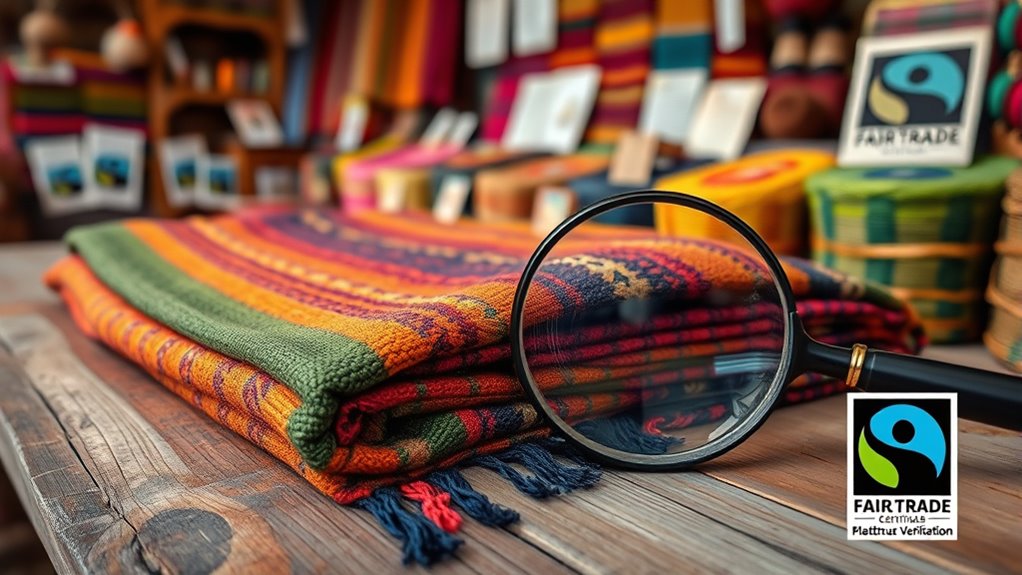
To verify fair-trade certification claims, start by examining the certifying organization’s credentials and reputation. This guarantees they genuinely promote sustainable sourcing and artisan empowerment. Next, look for official certification labels on products and cross-check their validity online. Be wary of vague claims that lack specific details about the certification process. Additionally, research the company’s supply chain transparency—do they provide clear information about how artisans are supported and paid fairly? Confirm that the certification aligns with recognized standards for fair trade practices. Verifying these elements helps you avoid greenwashing and supports genuine ethical production. By doing so, you contribute to a fairer, more sustainable global marketplace that empowers artisans and promotes responsible sourcing.
The Role of Certification Bodies and How to Trust Them

Certification bodies serve as the gatekeepers of fair-trade standards, ensuring that products meet ethical and sustainability criteria. Their role is to evaluate suppliers based on strict guidelines, fostering supplier transparency and accountability. When you see a fair-trade label, trust depends on the certification body’s rigor and independence, which verify certification validity. You should check whether the organization conducts regular audits and maintains transparent processes, so you can be confident in its credibility. Reliable certification bodies provide clear documentation and uphold strict standards, reducing the risk of false claims. By understanding their role, you can better assess whether a product’s certification truly reflects ethical practices, helping you make informed choices and support genuinely responsible producers.
Practical Tips for Consumers to Support Genuine Ethical Artisans

Supporting genuine ethical artisans starts with doing your research and asking the right questions. Look into their artisanal techniques to guarantee craftsmanship isn’t mass-produced. Ask about their sustainability practices—are they using eco-friendly dyes or renewable materials? This helps verify their commitment to ethical standards. Consider visiting their websites or stores to see transparency in their processes. Here are some practical tips:
Research artisanal techniques and sustainability to ensure authentic, eco-friendly craftsmanship.
- Check for detailed information on artisanal techniques and sourcing.
- Seek out brands that openly share their sustainability practices.
- Support small-scale artisans who prioritize fair wages and environmentally friendly methods.
Frequently Asked Questions
How Often Do Fair-Trade Certifications Undergo Renewal or Reassessment?
You might wonder how often fair-trade certifications undergo renewal or reassessment. Typically, certification audits are conducted annually or every few years, depending on the certifying body. These audits ensure the certification validity by reviewing how producers meet fair-trade standards. Regular reassessment helps maintain trust in the certification, ensuring that ethical practices continue. Keep in mind, renewal cycles vary, so it’s good to stay informed about the specific certifier’s requirements.
Are There Regional Differences in Fair-Trade Certification Standards?
Imagine walking through a vibrant marketplace, where colors and textures reflect local traditions. Regional variations in fair-trade certification standards exist because cultural influences shape fair-trade practices differently across regions. These differences mean that certification criteria may adapt to local customs, ensuring fair labor conditions and sustainable practices align with each area’s unique context. So, when verifying certifications, consider these regional nuances to truly understand their authenticity and relevance.
Can Certifications Be Revoked, and Under What Circumstances?
You might wonder if certifications can be revoked. Yes, they can be if a certification’s legitimacy is compromised or if the certified entity fails to meet compliance standards. Authorities regularly monitor adherence to fair-trade criteria, and violations like labor abuses or misrepresentation can lead to revocation. Ensuring certification compliance is vital for maintaining trust and authenticity, so certifications are revoked when standards are no longer upheld or certification legitimacy is questioned.
What Are the Common Pitfalls When Interpreting Certification Logos?
When interpreting certification logos, you should watch out for logo misinterpretation, which can lead to branding deception. Some logos might look authentic but are not officially certified, so you might assume a product is fair trade when it isn’t. Always verify the certification directly with the certifying organization rather than relying solely on the logo. This helps guarantee you’re supporting genuinely ethical brands and avoiding misleading branding tactics.
How Do Certifications Address Environmental Sustainability Alongside Fair Labor Practices?
You might wonder how certifications address environmental sustainability alongside fair labor practices. Certifications promote transparency by setting standards that reduce environmental impact, like responsible water use and waste management. They also guarantee fair labor practices, creating a balanced approach. By choosing certified products, you support companies committed to environmental sustainability and ethical working conditions, helping you make responsible purchasing decisions that benefit workers and the planet alike.
Conclusion
By taking a moment to verify fair-trade claims, you not only support authentic artisans but also help create a more ethical weaving industry. It’s funny how sometimes, the smallest steps—like checking labels—can lead to big changes. So next time you’re shopping, trust your instincts, do a quick search, and remember that your choices genuinely make a difference. After all, supporting genuine fair-trade practices is a simple act that can ripple outward in surprising ways.
